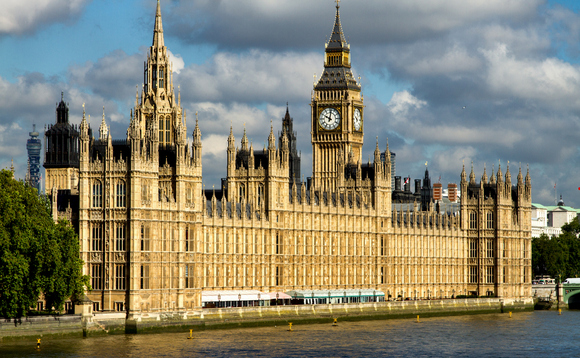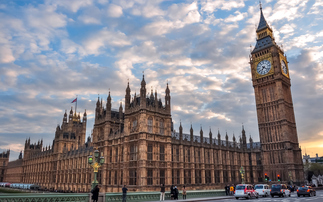Credit: iStock
But more than 1,000 EU-derived laws are still set for the chop this year and it remains unclear how many have climate and environmental policy implications
The government has officially rowed back on its controversial plan to automatically ditch thousands of EU-derived laws at the end of this year, today announcing a less-rushed approach to regulatory reform that it argued would reduce red tape for businesses and help grow the economy.
Green groups, however, branded the government's regulatory reform agenda as "a shambles from the very beginning", and warned potentially hundreds of critical environmental and climate laws could still face the chop under its newly announced approach to the Retained EU Law Bill.
The Bill, which is currently making its way through Parliament, had included a hugely controversial 'sunset clause' that required all 4,000 or so UK laws thought to have originated from the EU prior to Brexit to be reviewed by the civil service by the end of the year to determine whether they should be retained or not.
The clause stipulated that all EU-derived laws would be automatically wiped from the UK statute books overnight on 31 December this year unless specifically flagged for reform or retention before the deadline, prompting concern the arbitrary deadline could result in hundreds of laws being axed without any sort of review.
Business groups slammed the proposals, warning they would create huge regulatory uncertainty that would undermine investment.
Campaigners also warned reviewing and potentially reforming or revoking so many laws could pose serious risk to environmental and climate protections in the UK, with an estimated 1,800 green laws thought to have derived from Britain's previous membership of the EU.
Defra alone is through to have identified around 1,000 EU-derived laws which come under its jurisdiction, while a study earlier this year calculated that removing or watering down retained EU environmental laws in just four areas - chemicals, water, air quality, and habitats - could cost the UK economy almost £83bn over 30 years.
However, having stoked a backlash from myriad green groups, business bodies, trade unions, and political figures over its proposals, the government today announced a U-turn over the sunset clause as part of a flurry of regulatory reforms planned for later in the year.
The government conceded the sunset clause had been proving a challenge on Whitehall, arguing that the review programme "was becoming more about reducing legal risk by preserving EU laws than prioritising meaningful reform".
Business and Trade Secretary Kemi Badenoch said the government would now look to revoke around 600 laws directly through the Retained EU Law Bill, in addition to ditching a further 500 through both the Financial Services and Markets Bill and the Procurement Bill.
"I have listened to the concerns of business of all sizes and have made it a priority to tackle the red tape that holds back UK firms, reduces their competitiveness in global markets and hampers their growth," she said. "We are taking back control of our laws after Brexit, reducing and improving regulation and giving businesses the freedom to do what they do best - sell innovative products, create jobs and grow the economy."
Laws governing working time regulations and competition and markets rules look likely to be overhauled, in the first of a series of deregulatory moves that the Department for Business and Trade said it would be making this year in a bid to save employers £1bn a year.
The Department also today launched a fresh consultation over its regulatory plans for the energy sector, including proposals to reform Ofgem and establish a Future Energy Systems Operator to help oversee the UK's shift towards a net zero power grid by 2035.
However, at present it is unclear precisely which laws the government proposes ditching and how many of these laws are related to climate change and the environment, although a list of the 1,100 or so EU-derived laws that are now set for the chop is expected to be published by the government overnight.
The government insisted that "regulation should not hold back businesses from delivering for their customers, competing, and contributing to the growth of our economy and the maintenance of our environment", but stressed that "where regulation unnecessarily gets in the way, we are clear that we will remove it".
Tim McKenzie, policy chair at the Federation of Small Business, welcomed the fresh approach to regulatory reform announced today, as he lamented the "cumulative burden" of new policies and regulations that had been created by successive governments over the years.
"We are pleased to see a change of approach here, moving away from regulation as a first resort, alongside a reduction in administrative requirements that divert time away from running a business, and more of a focus for regulators on stimulating economic growth," he said.
The wide array of trade bodies, green groups, think tanks and experts who had voiced their opposition to the rushed timetable for ditching of potentially thousands of EU-derived laws will also be breathing a sigh of relief that the sunset clause has been ditched by the government today.
However, many warned that even under the new changes there was still a significant risk of critical environmental and climate protections being ditched, and that as such there remained a great deal of regulatory uncertainty for businesses over the future of green rules and regulations.
Craig Bennett, chief executive of The Wildlife Trusts, said the Bill had been "a shambles from the very beginning".
He acknowledged that ditching the sunset clause meant the "immediate threat to vital laws that protect nature and people" had now gone. But he warned that "the huge problem posed by the bill still remains because it will allow future governments to revoke important laws at whim, whenever they want to".
"Ministers should never be given carte blanche to pick and choose which laws should be kept or binned without public consultation or scrutiny - that is fundamentally undemocratic," he said.
Bennett also pointed out the uncertainty created by the government's threat to ditch potentially thousands of laws had "caused huge problems for business" and nature protection organisations, as he called for far more clarity over the government's regulatory plans going forward.
"Ministers must stop seeing environmental law as a burden because it helps stop more sewage entering our rives and ensures food is safe to eat," he argued. "Given the urgent need to address the nature and climate crisis, they should be strengthening protections, not ripping them apart."
The Office for Environmental Protection (OEP) - the government's environmental watchdog established after Britain's exist from the EU - has also previously voiced its criticism of the government's rushed timetable for reviewing EU-derived laws.
Dame Glenys Stacey, chair of OEP, said she therefore welcomed the changes to the proposed Bill announced today, but warned the watchdog would monitor closely which laws are now set to be revoked this year "to ensure we are confident that environmental protection is not reduced".
"As we warned in our evidence to the Bill Committee, rushed law-making is not conducive to addressing environmental problems that are difficult, complex and long-term," she said. "There was a risk that the government's own ambitions for the environment were undermined. The amendments go a long way to mitigating that risk. We also welcome the additional opportunities for Parliamentary scrutiny in the revised approach."
Meanwhile, green business groups were at pains to stress that well designed regulations were hugely beneficial to UK businesses, helping to stimulate jobs, growth, and innovation on the path to a net zero economy.
Signe Norberg, head of public affairs and communications at green business body the Aldersgate Group, welcomed the decision to remove the sunset clause, but urged the government "to focus on ensuring the UK has the necessary regulation in place to meet our climate and environmental goals".
"Ambitious, well-designed and properly enforced environmental regulations have driven innovation, private investment and job creation in environmental goods and services - with around half a million jobs having already been created across the UK's low carbon economy. Businesses recognise this and welcome the clarity and level playing field that smart regulation can deliver for them," she said. "To maximise these benefits and remain on track for the UK's climate and environmental targets, the regulatory initiative must be targeted, evidence based, and subject to adequate parliamentary scrutiny. Future governments will require flexibility to introduce necessary legislation to meet the UK's long-term climate and environmental targets."
Want to understand what is going on at the cutting edge of sustainability? Check out BusinessGreen Intelligence - the premier information for professionals focused on the UK's green economy.









